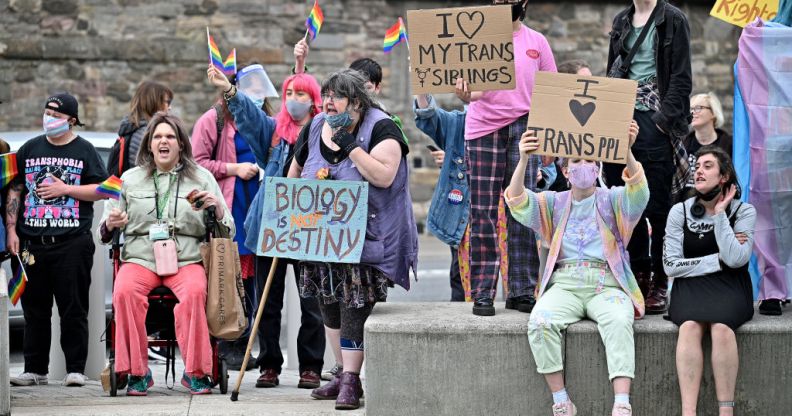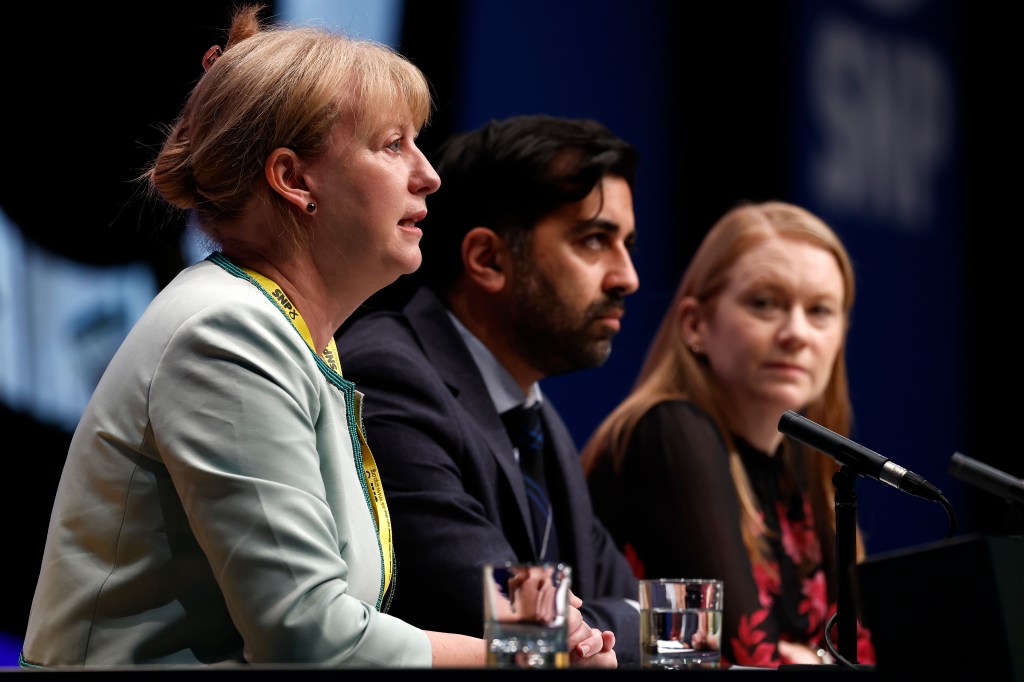Scotland and beyond celebrates historic gender recognition reform: ‘Trans people deserve dignity’

Trans rights activists hold a demonstration in September in Edinburgh. (Jeff J Mitchell/Getty)
Trans people, advocates and allies are celebrating Scotland’s revolutionary Gender Recognition Reform Bill passing through parliament.
The bill passed by 86 votes to 39 on Thursday (22 December), and means trans people in Scotland will soon be able to gain legal recognition without the need for a medical diagnosis.
The bill will also allow those aged 16-18 to access legal gender recognition, and will cut the time trans people must wait for a gender recognition certificate from two years to a few months.
Vic Valentine, manager of Scottish Trans, said trans people across Scotland will be feeling “pleased and relieved”.
“The law that has passed today will mean that at important moments in their lives, like when starting a job or giving notice to be married, trans men and women will be able to show a birth certificate that reflects who they are,” Valentine said.
“We all want to be able to live true to ourselves, and by voting for these simple but important changes to the existing process for trans people to be legally recognised, MSPs will improve trans men and women’s lives, by allowing them to live with the dignity and recognition that everyone deserves.”
Shona Robinson, the Scottish government’s social justice minister, said today is a “historic day for equality in Scotland”.

“It simplifies and improves the process for a trans person to obtain a gender recognition certificate – which many currently find intrusive, medicalised and bureaucratic,” she said.
Robinson added that the bill is a “significant step forward in creating a more equal Scotland, where trans people feel valued, included and empowered”.
The trans youth charity Mermaids said the win is “a historic victory in the fight for equality that will transform the lives of trans people in Scotland”.
The private medical service GenderGP congratulated all involved in enabling the bill to pass, and wrote: “It’s truly fantastic to see what’s just been achieved in Scotland. This act is about to make the lives of so many trans people so much easier.”
Stonewall chief executive, Nancy Kelley, posted: “Absolutely over the moon to see the #GRRBill pass in the Scottish Parliament today. Trans people deserve to be able to live their lives in dignity. This is an important step towards that goal.”
Journalist and LGBTQ+ activist Owen Jones also took to Twitter to celebrate the victory.
In a comprehensive thread he wrote: “For several years, British society has been in the grip of an escalating anti-trans moral panic, whipped up by an increasingly radicalised anti-trans movement, and facilitated by a media industry which has never found a minority it won’t hound.
“In a long honoured tradition, too, politicians – mostly, but not exclusively on the Conservative benches – have sought to weaponise hostility against trans people to build their own careers, just as they’ve done with migrants, refugees, Muslims, gays – the list is endless.”
Jones added: “We all have a responsibility to stand by our trans siblings”.
What does Scotland’s Gender Recognition Reform Bill mean?
Director of Scottish organisation the Equality Network, Tim Hopkins, thanked all of the MPs who voted in favour of the bill.
He noted the importance of amending the Gender Recognition Act 2004, which he said is now considered “as imposing a process that is difficult, demeaning, and falls well below international human rights standards.”
“The bill makes important changes to the law, that significantly improve the current process that trans people in Scotland must use to update their birth certificate.”
When the new law is enacted, trans people in Scotland will be able to gain a Gender Recognition Certificate through a system of self-declaration, and will not have to submit any medical evidence or proof they have lived as their true gender.
Those over 18 will need to live in their “acquired gender” for three months – down from two years.
The reforms will also drop the lower age limit for legal recognition to 16 – those under 18 will face a six month wait before they can access a GRC.

Scottish Greens equalities spokesperson, Maggie Chapman MSP, said she is delighted Scotland’s gender reform has passed.
“Trans rights are human rights and I am proud that our parliament has voted to bring Scotland closer in line with best international practice while improving the lives of our trans siblings,” she said.
Chapman said the last three days of debate, which saw delaying tactics from the Scottish Tories, have highlighted the best and worst of the Scottish Parliament, but that the focus remains on the “progressive and inclusive society that we want to build”.
“But it is also about our past and all of the generations of our trans and non-binary friends, colleagues, comrades and relatives, those who are amongst us, and those no longer with us, who have had to put up with delay, abuse, loss and grief. Today is for you. We see you and we thank you.
“We cannot undo the pain that has been inflicted, but we will do all we can to ensure that the future we build is a better one.”

